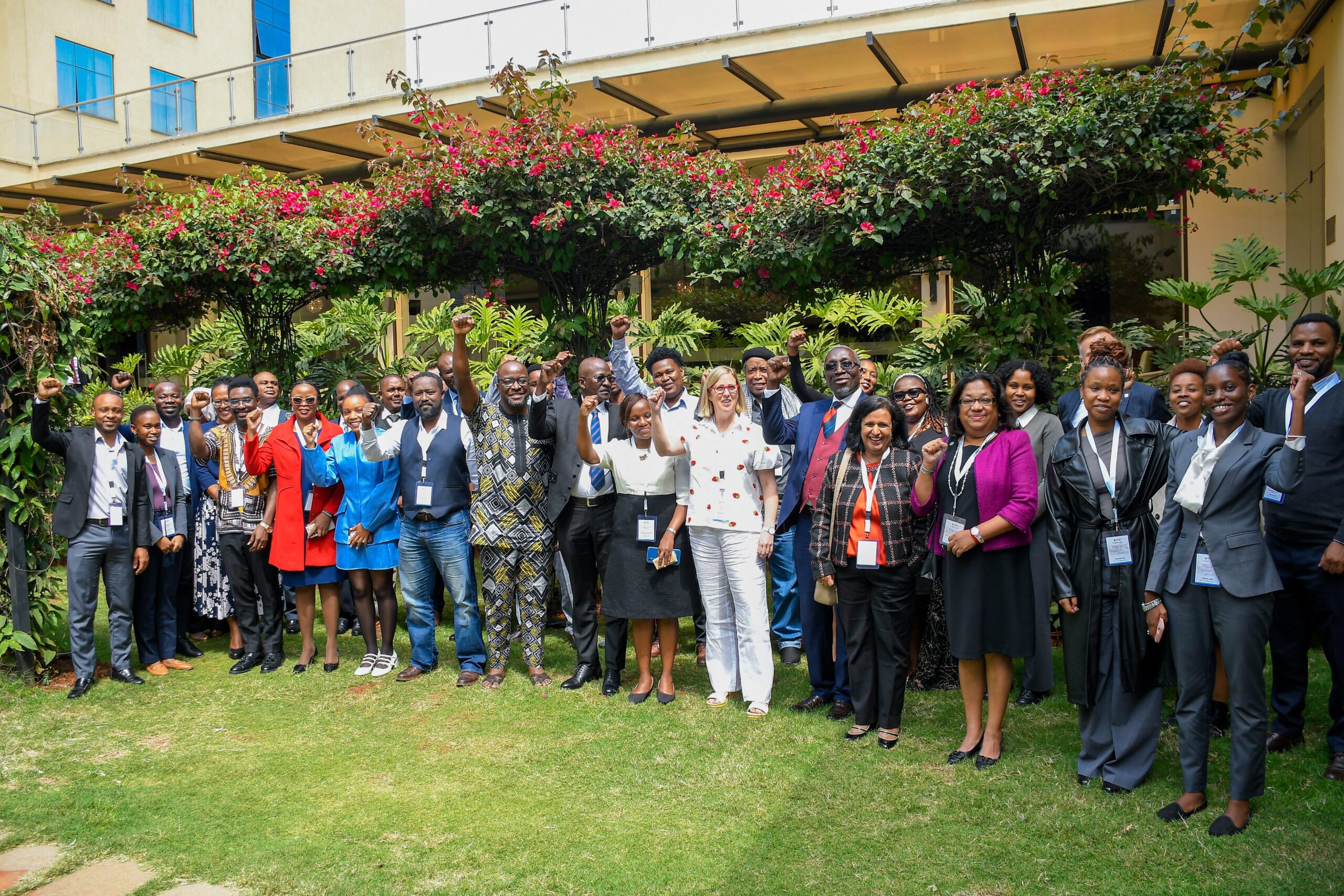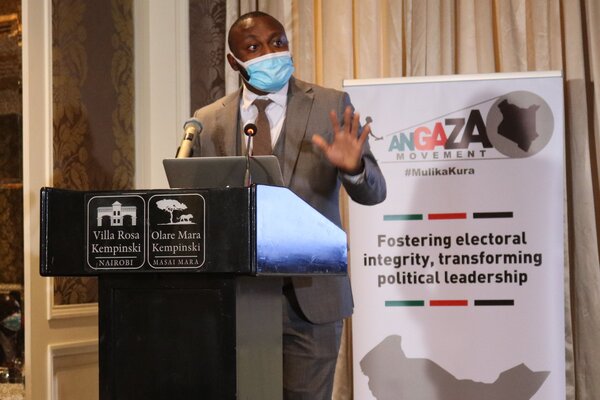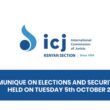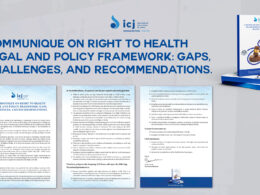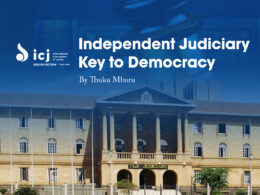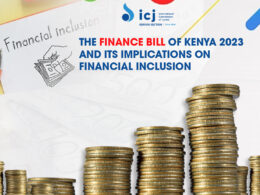By Silas Kamanza
Angaza Movement was launched on October 13, 2021, at the Villa Rosa Kempinski Hotel in Nairobi.
The Movement consists of 18 organisations, including ICJ Kenya, and aims to advance accountability and integrity in our voting rights, electoral and political processes at all societal levels.
As part of convening partners, ICJ Kenya’s Executive Director gave opening remarks during the launch and ICJ’s Programme Officer, Silas Kamanza presented on the violent state during elections.
Read his presentation below.
Background
- In 2005, a junior scholar, Ms Caroline Elkins, came to worldwide prominence after publishing a book that exhumed one of the nastiest chapters of British imperial history: the suppression of Kenya’s Mau Mau rebellion and British imperial violence;
- In Ms Elkin’s book, 1.5 million Kenyans were not only placed in detention camps and heavily patrolled villages, but also subjected to systematic violence and inhumane conditions;
- A reading of Caroline Elkin’s Britain’s Gulag: The Brutal End of Empire in Kenya, shows us that violence and the use of force have deep colonial origins. Colonialists used violence to ensure submission by Africans;
- Violence has come to be regarded as one of the most striking features of Kenya’s political scene. Every general election held, since 1991 and 2017 has been marred with political violence, although of varying intensity and scope.
This can be seen throughout the reports by the Waki, Krieglar, the Ndung’u and the TJRC reports.
- In the 2007/08 election, chaos that riddled the 2007 post-election period led to the death of 1133 – with the police responsible for 405 deaths.
- Most recently, in 2017, the KNCHR noted 37 deaths in 4 counties while the Missing Voices Coalition noted a higher number of almost 67 deaths.
How
- Violence is the inescapable reality of Kenya’s electoral cycle.
- During election periods, clashes have purposely been designed to alter voting patterns and create homogenous voting blocs;
- Violence is often used by incumbents as a method of manipulating election outcomes through prevention from taking part in electoral processes;
- Further, Police and militia are directly used to intimidate voters. Maina Kiai, the former UN Special Rapporteur on the right to freedom of assembly and of association noted that police deployed to opposition strongholds use extra-ordinary brutality and violence against voters;
- In 2013 and 2017, observations groups including KYSY and ELOG noted outbreaks of violence and unrest during the primaries, with little reaction from relevant government agencies;
- Gender-based electoral violence experienced by women remains one of the primary barriers to their participation in politics. Physical, sexual and economic violence are meted to discourage, intimidate, and ultimately prevent women from participating in the elections
- A lack of comprehensive implementation of laws by security agencies leaves women vulnerable to harassment, intimidation, threats, hate speech, stereotyping and physical attacks from opponents and their supporters;
What
- Ahead of the 2022 general elections, the importance of expeditious, impartial, consistent, and transparent resolution of electoral disputes cannot be gainsaid. As such, we appreciate the importance of the Supreme Court as the highest forum in Kenya which handle disputes including those that emanate from electoral contestations.
- This is because Violence emanates when there is lack of confidence in our dispute resolution mechanisms;
- In 2017, we went to the Supreme Court and argued that the violence preceding the fresh presidential election, including police violence, had prevented most parts of western Kenya and some other parts of the country from participating in the election.
- However, the Supreme Court has attracted heavy criticism for failing to provide a clear guidance on pertinent issues including leadership issues as required by the Chapter 6 of the Constitution and as stated before, the threshold of elections;
- This fact was compounded by the decision of the electoral body to cancel the election in a total of 27 constituencies.
- As a result, the election had not met the constitutional threshold of a free and fair election. It had failed the universal suffrage test as a huge part of the country had been denied the right to vote.
- Nonetheless, the Supreme Court dismissed our claims.
- In what my Lecturer and friend, Muthomi Thiankolu calls Legal Sophistry, this lack of accountability for top perpetrators exacerbates the situation;
- To date, survivors of SGBV in 2007 are still pursuing justice through the Courts.
As previously noted, Violence emanates when there is lack of confidence in our dispute resolution mechanisms:
- We need to rethink the and rebuild trust in our electoral management and dispute resolution mechanisms. We need to equip our judiciary and political parties dispute resolution with adequate funds to enable them prepare and carry out their mandate as required by the Constitution 2010;
- Ahead of the 2022 general election, we need law reform proposals as far as the electoral system and the electoral dispute resolution mechanisms are concerned;
- We need to rethink issues of timelines which are generally short. We need to rethink accessibility of these avenues – leveraging on devolution and further the enforcement mechanisms by the PPDT and Judiciary with regard to electoral cases and enhance remedies;
- We have to support capacity building initiatives for our Judiciary and embrace technology in Information Management while maintaining integrity and security.
- We need to strengthen Stakeholder Engagements and collaborate more.
Whats next?
- During elections, there should be standards on the rules of engagement for public order management. We should enhance me the protection of electoral violence targets especially vulnerable and marginalised groups, and create incentives to pursue justice for victims, all within the bounds of the legal and policy restrictions governing elections.
- Particularly, we should be concerned about the potential for the abuse of basic human rights and denial of electoral justice, particularly those of the poor and marginalised, in light of COVID-19.
- Security forces need to implement the COVID-19 containment measures with strict adherence to constitutional and human rights principles;
- Relevant Commissions, Authorities and departments including KNCHR and IPOA need to take note of the increase in cases of police misconduct and further investigate the cases of police violence that have and will be reported during the election period;
- Agreeably, in the recent years, technology has improved and grown to unimaginable extents. In the age of photoshop and deep fakes, violence has since moved to electronic platforms, perpetrated by armies of keyboard warriors aiming to sway public opinion during high pressure political instances such as elections and protests.
- A recent report by the non-profit Mozilla Foundation in 2020 observed the inauthentic amplification of false narratives which create an environment where nobody knows what is true or false anymore. Kenya itself underwent an extensive disinformation campaign at the hands of Cambridge Analytica in 2017.
- Violence, meted in the form of online attacks and disinformation campaigns have proven to be the biggest threats to the rule of law and democracy in our today. Voter apathy amongst millions of young Kenyans, based on this disinformation, is increasing at an alarming rate.
Ladies and gentlemen,
- The people’s confidence in the value of their vote is predominantly reliant on peaceful environment, security, trust and resilience of the infrastructure that makes the country’s elections possible.
- Violence is a tool that is used to disrupt our Ubuntu Spirit and ability to come together and actively demand for integrity and accountability in governance.
- Larry Sabato, a renowned political scientist and a Robert Kent Gooch Professor of Politics at the University of Virginia, noted that ‘Every Election is determined by the people who show up’ I say that it is determined by the people who do not.




